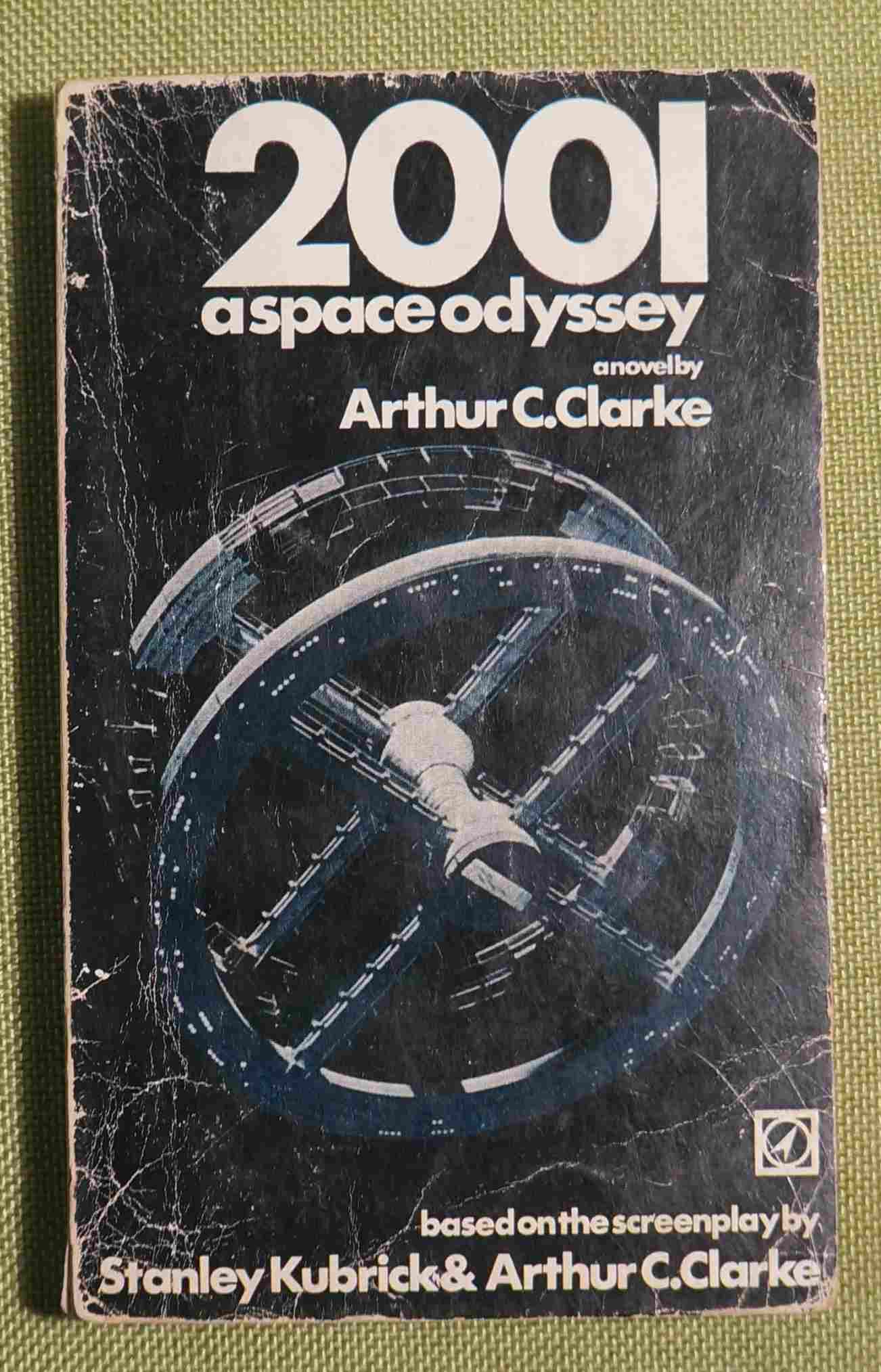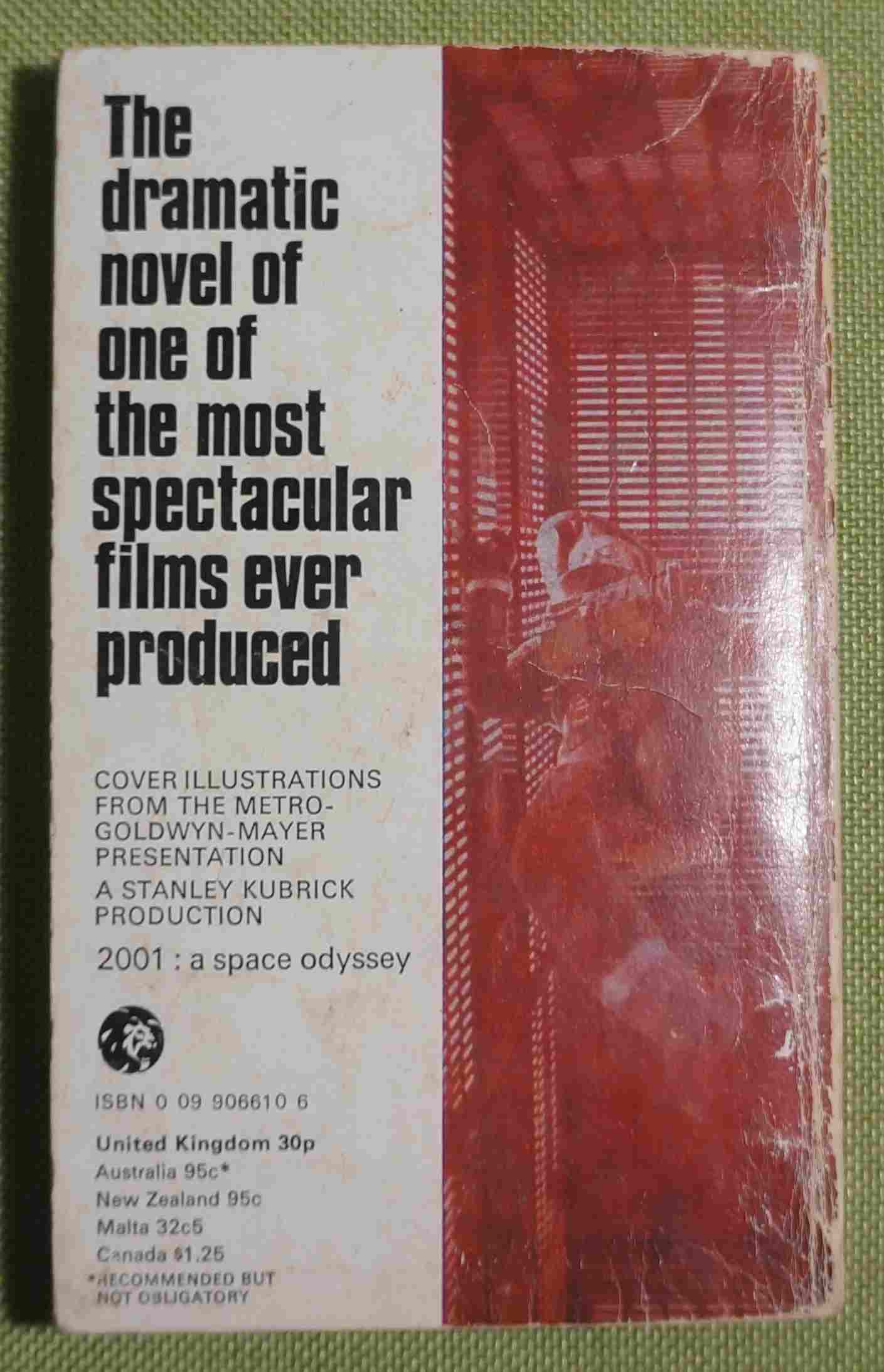FILM DIRECTOR: Stanley Kubrick
SCREENWRITER: Arthur C. Clarke, Stanley Kubrick
FILM STARS: Keir Dullea, Gary Lockwood, William Sylvester, Daniel Richter, Leonard Rossiter, Margaret Tyzack, Robert Beatty, Sean Sullivan, Douglas Rain, Frank Miller, Edwina Carroll, Penny Brahms, Heather Downham
COUNTRY: UK-USA
THIS BOOK
AUTHOR: Arthur C. Clarke
TYPE: Novelisation
PUBLISHER: Arrow
THIS EDITION PUBLISHED: 1973
COUNTRY: Great Britain COVER: Paperback
THE ORIGINAL BOOK
ORIGINAL AUTHOR: As Above
YEAR FIRST PUBLISHED: 1968
ORIGINAL BOOK TITLE: The film title
NOTES
GENRE: Sci Fi
WORDS: 2001 A Pretentious Space Boredom.
I speak heresy to some but luckily the generation (which includes some of mine) that were enthralled with this film are shrinking. Now, only film students, pretentious types, want to be intellectuals, pot heads or people who feel the need to “name drop” to show they know something about film, revere this film.
Harsh?
The film has its merits. The leads (Lockwood and Dullea) are good, the visuals (as in most Kubrick films) are stunning, the music is well chosen, the story is potentially interesting and the effects and set design are impressive, but all that is padded out with so much chaff. The filler combined with the weight of highbrow expectations that the film must be loved makes me kick the other way, perhaps more that I would have done otherwise, though the pacing alone, which is (typical of late period Kubrick) slow and deliberate (and more than a little dull) would have been enough of a fault in my mind. I’m not sure why pretentious critics like such ponderous films … there is an assumption that if it moves it can’t be good or serious …. sort of goes against what moving pictures are all about.
Another criticism, and one I didn’t come up with but is readily obvious if you watch enough Kubrick is that none of the humans are remotely human. They are cold and one note. This has always been a Kubrick problem when he is left to his own devices … his characters are marionets. Unfortunately, the lack of humanity in a the characters results in a lack emotional connection between you and the character. You may be impressed intellectually (though even that is debateable) but you are never involved or moved. It was critic Andrew Sarris who once said (in The American Cinema (1968)…one of my favourite books on film … “Kubrick spent five years and ten million dollars on a science fiction project so devoid of life and feeling as to render a computer called Hal the most sympathetic character in a jumbled scenario”.
Which is, perhaps, fitting as the film is about HAL and intelligent almost human computer (though even HAL isn’t as “human” or as interesting as Edgar the computer in Electric Dreams (1984))
As the on-board computer for a mission to Jupiter, HAL controlled everything from electronic systems, weapons, to adjusting an astronaut’s headrest. He boasted of his error-free record, but when he mistakenly declares a piece of equipment to be faulty, the two working astronauts (three others are in suspended animation) discuss the problem and decide to deactivate him (it). He (it), however, reads their lips and tries to terminate them before regressing, like some mentally unbalanced human criminal, into a childlike nature.
The novel by Arthur C. Clarke was developed concurrently with Stanley Kubrick’s film version (they worked on the book together but only Clarke got credit initially) and published it after the release of the film but is based in part on various short stories by Clarke, including “The Sentinel” (first published in 1951 under the title “Sentinel of Eternity”). I don’t really need to read it or the novelization. I like near future sci fi but the film has soured this for me.
Arthur C. Clarke called the eventual emergence of a HAL-like computer inevitable. Science fiction writer Ray Bradbury, a detractor of “2001” (but a friend of Clarke’s) dismissed it as speculation and fantasy and said computers were no more than libraries. The whole intelligent sentient machine argument in interesting though not for in depth discussion here. With the way technology has evolved (and with how sci fi has evolved in popular culture – Terminator and the rise of the machines anyone?) it is easy to lean to Clarke though there is something appealing about Bradbury’s position.
I know the film is meant to be thought provoking and intellectual but it’s so much much armchair pop philosophy. I mean it’s like reading Noam Chomsky instead of Aristotle for philosophy. There may be more catchy phrases but you aren’t going to learn much or get passing results.
Andrew Sarris famously panned 2001 when it was released (then reversed himself (apparently) after seeing it under the influence … there are no studies on how many people fell asleep during the film whilst under the influence). At the time he said:
“2001: A Space Odyssey is a thoroughly uninteresting failure and the most damning demonstration yet of Stanley Kubrick’s inability to tell a story coherently and with a consistent point of view. His film is not a film at all, but merely a pretext for a pictorial spread in Life magazine. Kubrick, like Lelouch, is an undeniably competent photographer, but photographers seldom make the best directors. 2001 has little writing or acting to speak of and makes little sense. The first section of the film begins where Planet of the Apes left off at the “Dawn of Man.” Kubrick and science-fiction writer Arthur C. Clarke employ a bunch of monkey masks and monkey suits to present a very debatable theory of human evolution in terms of force and acquisitiveness. We then suddenly leap into a routine moon voyage described in great brand-name-plug detail (Bell, Pan-Am, Howard Johnson’s, Hilton) with Poverty Row players like William Sylvester and Robert Beatty. A big, black slab figures in each section of the film, but we never find out exactly what it is or what it signifies. The third section, by far the most interesting, features Keir Dullea and Gary Lockwood as two automaton astronauts pitted against a computer that speaks in insidiously wheedling tones. Ironically, the computer seems to have more feelings than the humans do, a curiously pessimistic attitude toward a project of this magnitude in predicting scientific “progress.” The ending is a mishmash of psychedelic self-indulgence for the special effects people and an exercise in mystifying abstract fantasy in the open temple of High Art”.
https://scrapsfromtheloft.com/movies/2001-a-space-odyssey-1968-reviews-by-andrew-sarris/
Later Sarris said: “I think the great impact of ‘2001’ is curiously a humanistic impact,” he says. “One thing that was uncanny about the movie and seemed like a shortcoming at the time was that it was boring and overlong. But it prophesied how boring space travel is, how outsized and incommensurate it is compared to human life and human consciousness. No matter how far into outer space we go, we can’t escape ourselves.”
The defence to the dreariness is usually the film was prophetic about space travel … really?
I haven’t seen it under the influence, so my opinion remains.
And, in any event, 2001 has come and gone and we no nearer to travelling to Jupiter than we are to the rings of Uranus (pun intended). Will we be closer one day? … yes of course but if the timeline is that far out for experts Kubrick and Clarke out then so is the premise of the film, especially in its estimation of our abilities and of all the crap and shit that goes into making us human, which has nothing to do with the intellect.
When it comes to computers out of control, John Carpenter’s first film (as low budget as 2001 is expensive) Dark Star (1974), which was also something of a response to 2001, is far better (it’s a masterpiece). It has everything 2001 doesn’t – humanity, humour, and the acknowledgement of human intellect but with an understanding of our physical limitations. Yes, it is all very well travelling to Jupiter but it becomes a lot more difficult if the toilets don’t work.
It’s clear I’m not a Kubrick devotee but I’m not a hater. His films are all worth watching and well photographed (he was a glossy magazine photographer after all) but the middle-class pretentiousness and lack of humour kills them for me. Rarely do you watch them more than once (well some people do) and if you do you rarely watch them as a whole but find yourself rewatching specific scenes. His best films are his early B&W films (Killer’s Kiss (1955) and The Killing (1956)) when he was constrained by small budgets and which are wonderfully inventive), and his big studio productions which owe more than a little to star / producer Kirk Douglas (Paths of Glory (1957) and Spartacus (1960)). The joys of Lolita (1962), Dr Strangelove (1964), Clockwork Orange (1971), and The Shining (1980) and there are joys, owe more a lot to external factors forces (Lolita owes more to author Nabokov and James mason’s performance, Clockwork Orange to author Burgess and actor Malcolm MacDowell’s performance, The Shining to Stephen King and Jack Nicholson’s performance) though they all seem a little dated. It may be true that Kubrick never made a bad film (and it says something that with his most well-known films you can see the money on the screen) but I’m not sure he made a truly great one.
Ultimately, he is part of the belief cult that the fewer films you make the better director you must be (here 13 films in 47 years) … of course all your films are going to be prima facie good when you don’t have to churn them out. But the directors that did churn them out year after year are ultimately more interesting, especially if they learnt from and transcended the commercial requirement to churn them out.
He (Kubrick), is much like those other great craftsmen (John Huston, Fred Zinnemann, David Lean) who, generally, found it difficult to make something out of nothing but always looked impressive on big budgets based on literary sources with A list actors. Yes, that was a backhanded compliment to all those mentioned.
Apparently, Kubrick continues to be cited as a major influence by many directors, including Christopher Nolan, Guillermo del Toro, Lars von Trier, Bryan Singer, Sam Mendes, the Wachowskis, Darren Aronofsky, and Gaspar Noé. https://en.wikipedia.org/wiki/Stanley_Kubrick
This is perfect and only reinforces my position on Kubrick.
See it once … on the big screen (yes, I saw it on the big screen at a revival). Take stimulants.
LINKS
TRAILER
the reissue trailer



It is truly a boring, pretentious movie. I always found a good litmus test to weed out film w-kers was to ask them what they thought of this shite. Inevitably, anyone who was enthusiastic about it turned out to be a tool.
Arthur C Clarke was terribly overrated. He had the occasional good idea but he was a dreadful , tedious writer. Kurt Vonnegut wrote that most science fiction writers knew nothing about science. Clarke knew some science, but couldn’t write decent fiction. He would have been more useful writing repair manuals for microwave ovens.
I didn’t know Kirk had a creative role in POG and Spartacus, both great films, particularly the first( anything that annoys the French government is to be applauded). Dr Strangelove is one of my favourite movies, though I think that is largely due to the genius of Peter Sellers. I agree with you that Kubrick was very fortunate in his collaborators.
yep re Kirk … no one pushes Kirk around.
His Bryna Production Company was involved with (partially funded) POG ..and was so before Kubrick got involved
There has been a tendency to up-play Kubrick’s involvement because the film works on so many levels. But he didn’t really have full artistic control. He got away with whatever Kirk let him get away with. His usual tinkering with the script was minimal (the happy ending he had rewritten to make the film more commercial was dropped / reversed) Screenwriter (the great) Calder Willingham (who was writing black comedy (not that POG was a comedy though there are some moments) before Kubrick had ever said “action”). I suspect Kubrick owes a lot to Willingham generally .
Kirk’s film company, Bryna, again (co) produced Spartacus. They removed Anthony Mann after a week of filming (a pity as Mann is a much better director than Kubrick) Kubrick had the least control (no substantial script input, no editing) over this film than any other. He distanced himself from it because probably of that (and probably because it made a lot of money – second only to 2001 (inflation adjusted)). During the filming, at age 30, he fought with legendary cinematographer Russell Metty, screenwriter Dalton Trumbo, and Kirk .. even Orson Welles at his most arrogant didn’t do that (and he was younger …and a much better director / writer).
I agree re Dr Strangelove though for me its Sterling Hayden. Peter Sellers, Andy Devine and George C Scott don’t hurt. I saw it as a late teen first and loved it .. .though I loved the not dissimilar (in storyline) Failsafe (1964) more. I showed them at different times to my kids who were at around my age then ….they also liked both but preferred the latter. Not sure why: my influence, their taste, changing attitudes to comedy, or the latter is just a better told tale?
Yes, I agree re 2001 being a litmus test (that and Lawrence of Arabia (another good film but not a great one). Nothing exposes middle brow film criticism and banality more than the mentioning of both as favourites.
Sterling Hayden was a remarkable actor and a very interesting person. His cameo in Dr Strangelove was essential to the success of the film. It was an absurd comic invention that was also realistically chilling.
I sometimes think SH didn’t get the kudos he deserved as the corrupt police captain in the Godfather. It’s a small role but a critical one to the narrative. When you look at the restaurant scene his performance ( alsoPacino’s) has a number of subtle nuances that really lift the scene.
agreed re SH. His autobiography “Wanderer” is one of the best film star autobios I have read, and I have read a lot. It’s excellent even if you have no idea of his films.